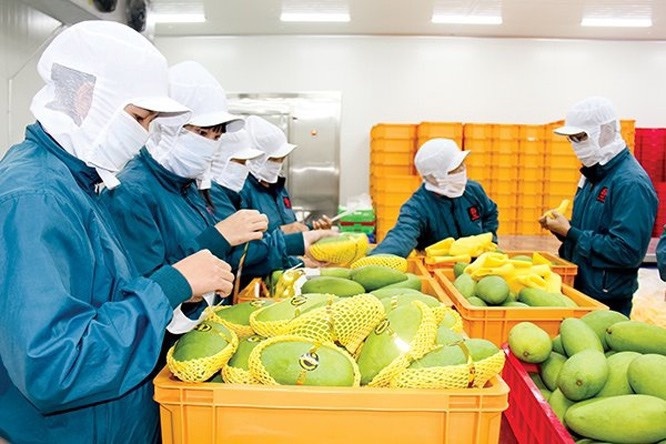Agricultures, Foods, News & Event
What does the fruit and vegetable industry do to take advantage of export potential?
Right from the beginning of 2024, Vietnam’s vegetable export sector received many good signals when the export turnover of vegetables and fruits increased. With current market developments, the fruit and vegetable industry is forecast to set a new record and will bring the agricultural industry from 6 to 6.6 billion USD in 2024. But for this industry to take advantage of opportunities, it also As for the export potential, there is still much work to be done.
According to a report from the Ministry of Agriculture and Rural Development, in the first quarter of 2024, Vietnam’s fruit and vegetable export turnover reached 1.28 billion USD (up 31.4% over the same period in 2023). This is the first time Vietnam’s fruit and vegetable exports have reached and exceeded more than 1 billion USD in the first quarter of the year.
Fruit and vegetable exports grew strongly
Preliminary statistics from the General Department of Customs show that fruit and vegetable exports in March reached 469.9 million USD, up 44.3% compared to February, and up 13.2% compared to March last year. .
The important consumer markets are still: China, Korea, Thailand, Japan… all growing well. In particular, the Vietnam Fruit and Vegetable Association said that the breakthrough in the fruit and vegetable export industry in the first quarter of 2024 is thanks to the huge contribution of off-season durian, when countries around the world, especially Thailand, has increased purchases of this fruit recently.
In the top 10 fruit and vegetable export markets of Vietnam (updated until the end of February 2024), Thailand has risen to 4th place. Specifically, Vietnam’s fruit and vegetable exports to Thailand reached 28.6 million USD (up nearly 126% over the same period in 2023), bringing Thailand’s market share up from 2% to nearly 4%.

Accordingly, fruit and vegetable exports to major markets in the first 3 months of this year recorded high growth. Leading in export value is the Chinese market, reaching 759.4 million USD, an increase of 32.4% over the same period in 2023. Currently, the Chinese market accounts for 59.1% of the total export value of the entire industry. Vegetables.
Experts predict that although the Red Sea incident causes many difficulties for Vietnamese fruit and vegetable products when exported to Europe and the US, it will boost exports to China and neighboring areas. especially for durian, coconut, dragon fruit, jackfruit, banana, mango…
It is expected that in the coming time, there will be 4 more products officially exported to China, including: Medicinal herbs, coconuts, frozen fruits and watermelons. Vietnam’s fruit and vegetable export turnover only accounts for about 2-3% of the total world fruit and vegetable export turnover. This means that the room for this industry is still very large.
Regarding the export of processed agricultural products, Mr. Nguyen Lam Vien, CEO of Vinamit Joint Stock Company, said that the EU market tends to decrease, but in return, Vinamit’s traditional markets are China, the US… Fresh fruit products such as jackfruit and durian increased.
“A number of other markets also appeared, because after the past two years, fruit and agricultural products have been very prominent… even rice exports have been very strong. I think the fruit market in 2024 will improve a lot, especially processed goods instead of fresh exports. Frozen goods industries including frozen or freeze-dried will definitely have more orders,” said Mr. Nguyen Lam Vien.
Control the quality of goods
One of the important factors behind the success of Vietnam’s fruit and vegetable export industry is the improvement in productivity and product quality. Thanks to the application of modern technology, strict quality management and training farmers on effective farming methods, Vietnamese agricultural products not only meet international standards but also gain trust from customers. consumer markets.
The Plant Protection Department, Ministry of Agriculture and Rural Development believes that in order to promote fruit exports and meet the regulations of importing countries, it is necessary to promote inspection, examination and supervision of growing areas and facilities. packaging facility, to control the quality of exported agricultural products right from the input and cultivation stages. Thereby, detecting and promptly handling cases of violations and fraud in the use of growing area codes and export packaging facilities.
Production management and goods quality control are an indispensable part of the export process. Businesses have placed special emphasis on training farmers on safe farming methods and environmental protection. Authorities also regularly inspect and monitor the quality of goods from production to transportation, ensuring compliance with regulations on food safety and industrial hygiene.
Along with that is the reorganization of the sustainable industry structure; create space for farmers and businesses to cooperate on the principle of equality and win-win cooperation. Developing agricultural value chains; Close links between stages from production, processing to product consumption.
Furthermore, to enhance transparency and product traceability, businesses have applied quality management systems such as ERP and barcode systems. At the same time, cooperation with international organizations and export partners is an important part of improving product quality and compliance with international standards.
In particular, localities need to develop mechanisms and policies to support and encourage businesses to invest in infrastructure, pre-processing, processing, preservation areas, and large-scale cold storage.
“With positive outlook forecasts, Vietnam’s fruit and vegetable export industry is proving its important role in enhancing the value of agricultural exports and contributing to the country’s economic development. Forecasting a new record of export revenue in the range of 6 – 6.6 billion USD in 2024 is a clear testament to the progress and efforts of this industry, while also opening up many new opportunities for the economy. Vietnam in the future”, an Agriculture expert commented.

